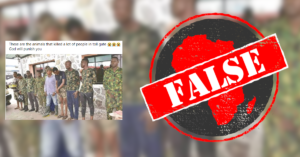A photo posted on Facebook in Nigeria on 21 October 2020 shows a group of men standing in a row, most of them wearing a camouflage uniform.
“These are the animals that killed a lot of people in toll gate,” the caption reads. “God will punish you.” The photo has drawn some 900 comments and been shared more than 10,000 times.
On 20 October Nigerian army soldiers allegedly shot at peaceful #EndSARS protesters against police brutality, at the Lekki toll gate in Lagos. Global human rights watchdog Amnesty International claimed at least 12 people died on the day, although Nigerian authorities disputed the figure.
Reports of the shooting and killing of protesters went viral on social media and drew condemnation from governments and public figures across the world.
Lagos state governor Babajide Sanwo-Olu apologised for the incident, admitting that Nigerian soldiers were responsible and that many protesters were wounded and at least two killed.
But the army has repeatedly denied involvement in the incident, calling it “fake news”. President Muhammadu Buhari did not acknowledge the shootings in a 22 October speech, meant to address the #EndSARS protests against police brutality.
But did the men in the photo pull the trigger at Lekki?

A Google reverse image search reveals that the photo is more than five months old and unrelated to the shooting at Lekki or the #EndSARS protests, which began in early October.
It appears in several news reports from early May, on the arrest of 41 men for impersonating soldiers in Lagos and neighbouring Ogun state. – Allwell Okpi
“These are the animals that killed a lot of people in toll gate,” the caption reads. “God will punish you.” The photo has drawn some 900 comments and been shared more than 10,000 times.
On 20 October Nigerian army soldiers allegedly shot at peaceful #EndSARS protesters against police brutality, at the Lekki toll gate in Lagos. Global human rights watchdog Amnesty International claimed at least 12 people died on the day, although Nigerian authorities disputed the figure.
Reports of the shooting and killing of protesters went viral on social media and drew condemnation from governments and public figures across the world.
Lagos state governor Babajide Sanwo-Olu apologised for the incident, admitting that Nigerian soldiers were responsible and that many protesters were wounded and at least two killed.
But the army has repeatedly denied involvement in the incident, calling it “fake news”. President Muhammadu Buhari did not acknowledge the shootings in a 22 October speech, meant to address the #EndSARS protests against police brutality.
But did the men in the photo pull the trigger at Lekki?

Photo from May 2020
A Google reverse image search reveals that the photo is more than five months old and unrelated to the shooting at Lekki or the #EndSARS protests, which began in early October.
It appears in several news reports from early May, on the arrest of 41 men for impersonating soldiers in Lagos and neighbouring Ogun state. – Allwell Okpi
Republish our content for free
For publishers: what to do if your post is rated false
A fact-checker has rated your Facebook or Instagram post as “false”, “altered”, “partly false” or “missing context”. This could have serious consequences. What do you do?
Click on our guide for the steps you should follow.
Publishers guideAfrica Check teams up with Facebook
Africa Check is a partner in Meta's third-party fact-checking programme to help stop the spread of false information on social media.
The content we rate as “false” will be downgraded on Facebook and Instagram. This means fewer people will see it.
You can also help identify false information on Facebook. This guide explains how.





Add new comment